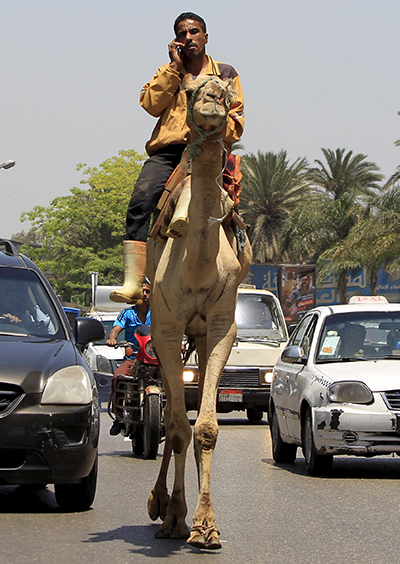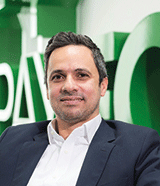 |
By Nehal El-Sherif Safaa Ahmed, a government employee, says that until about a year ago she used to stand in line at the cashier at her workplace to receive her salary. Sometimes the 40-year-old had to wait for hours, especially ahead of long weekends or holidays.
Now, as part of the government’s decision to digitize such payments, Ahmed and thousands of other employees have their salaries transferred to their bank accounts.
“Withdrawing cash from the ATM machines saved me a lot of time,” she says. “I also started paying for things I buy, food or clothes, using the card. I was worried the first time I did it, what if it does not work, what if I lose money, but now it is a much easier process.”
The Central Bank of Egypt says the project to issue over 5 million cards for all government employees reduces the overall cost of paying salaries and keeps money within the financial system.
Roughly 44 million people are eligible to enter the formal banking sector in Egypt, according to the World Bank. Yet only 10% to 15% of Egyptians have bank accounts, reflecting a long-standing distrust of banks. High bank charges and fears that banks may carry out investments forbidden by Islam are among the reasons Egyptians give for keeping their money at home, usually stuffed in the mattress, under the floor, or inside tin cans in the kitchen if they can’t afford a safe box.
So the government is pushing for financial inclusion, particularly the use of digital payment services.
The dominant digital products are split between mobile wallets and solutions for e-commerce. The numbers of end-users for both platforms have picked up in the past few years, though as a percentage of Egypt’s population of 93 million they are still small.
Luring more people to use digital platforms requires gaining their trust, says Sherif Kamel, professor of management at the American University of Cairo.
“This is a population that prefers to have the money rather than bank it,” he says. “We can’t take them from one end to the other unless they understand (how it works), feel safe and feel they trust the financial system more.
“You can have the applications available and accessible to everybody but unless people understand, trust and know how to use it, they will not,” Kamel adds.
That mission is not impossible in Kamel’s opinion. Egypt has a young population, around 65% is under the age of 35, so a boom in digital payment services should be easy to achieve if financial institutions focus on awareness campaigns.
“You need to really spread across thousands of villages nationwide,” Kamel says. “This is how you do financial inclusion, you don’t go for those who are reachable and accessible.”
For non-government entities that continue to pay their employees in cash, payroll service provider Dopay is eager to get their business.
[Egypt is] one of the top growing markets for online payments because of the new entry of end users – Omar Soudodi, PayFort
The London-headquartered startup chose to approach employers in Egypt to help them manage their payroll. After getting approval to operate in the country in 2015, Dopay started with one client for the first three months. By February 2016, Dopay felt it was well tested and started roll out of its service, according to Brad van Leeuwen, the company’s chief partnerships officer.
Between February and August last year, Dopay took on 100 companies as clients. Now, they have about 1,000, whose employees are offered a mobile app in Arabic or English and a purple debit card, which has yet to be enabled for online purchases. These employees can access their salaries at any ATM. The service is free at Barclays ATMs, but other banks only allow three withdrawals a month free of charge.
Van Leeuwen says Dopay chose to launch in Egypt because “there is a unique market opportunity and there is a need”, although the actual launch proved to be quite a challenge.
“The payments infrastructure is not there yet, and we face a lot of challenges even showing a transaction soon after it happens within an app; it’s completely normal in the UK or Australia, but the technology we had to build to enable that here is phenomenal. It’s been very complicated,” van Leeuwen says.
With $6.5 million of investment raised, Dopay is confident about its services in a market that has been dominated by banks.
“Banks not only don’t serve the majority of people, they don’t want to, largely because the business model means that the majority of the population (are) not profitable customers for them,” adds van Leeuwen.
Target workers
|
|
|
Brad van Leeuwen, |
Despite Dopay’s rapid growth, however, the number of users remains small when compared with the number of people who are paid in cash, such as workers in agriculture, fishing, construction and transportation, work in tourism and trade.
These workers are the targets of e-wallets providers. Mobile payment services were launched four years ago and there are now over 8 million users; the growth rate exceeded 60% between December 2015 and October 2016, according to bankers and financial technology companies.
While some users are already bank clients, unbanked users also join for several reasons. For example, it is easier to open an e-wallet than a bank account because all you need is a valid ID and a registered phone number.
The central bank also allowed agents, or non-financial service providers such as supermarkets or kiosks, to become registration points for clients, whose applications are then forwarded to the relevant bank.
“Customers can fill in the application through these agents, while the bank performs the verification process upon receiving the applications,” says Mohamed El Sabban, head of digital innovation at Commercial International Bank (CIB).
CIB launched its Smart Wallet in January 2016, and already has 250,000 users.
E-wallets are available on smart phones as well as feature phones using the USSD codes, which people have used for years to top up their phones. Not surprisingly, mobile network operators have been quick to launch their own e-wallets, building on the trust and familiarity already established in the market.
Still, 8 million users is less than 10% of the population.
“Mobile wallets are becoming really pervasive in many underdeveloped countries,” says Ayman Ismail, assistant professor at the school of business of the American University in Cairo. “Within three years, I expect 30 to 40 million wallets here.
“Fintechs are becoming a lot more visible globally, threatening traditional players with serious innovations, such as lending solutions, microcredits and credit reports, all within a very simple process.
“Banks see these trends coming whether they like it or not, so either they join the wave or these fintechs will eat their lunch.”
Banks are slow, bureaucratic, conservative by design … This is why there should be a sandbox for innovation – Ayman Ismail, American University in Cairo
However, to achieve financial inclusion, the state needs to make room for more innovation, as the banking sector remains restrictive, he says.
“Banks are slow, bureaucratic, conservative by design, because if you put your money in a bank, you want to know it is safe. This is why there should be a sandbox for innovation, try solutions on a small scale. When things work and they are safe, you start introducing them.”
In February, president Abdel Fattah el-Sisi ordered the establishment of the National Payments Council to attract more cash into the banking sector, support electronic payments systems, regulating and supervising bodies working within the sector – all with the goal of achieving financial inclusion.
Bringing more people into the formal sector will, in turn, increase tax revenue, one of the government’s main targets as part of a set of financial reforms that include tax hikes and subsidy cuts as part of the agreement for the approval of a $12 billion loan by the IMF in November 2016.
The government says such measures will help to restore the economy to its pre-2011 levels, before it was hurt by years of unrest. The central bank said foreign reserves hit $36 billion at the end of July, the highest level recorded since January 2011.
One of the National Payments Council’s decisions is that government service providers must have a digital means of payment, so their customers can pay all fees or receipts online. Implementation is expected in the next two years.
Payment service provider PayMob found that besides the regular payments people perform online, there was rapid growth in peer-to-peer transactions within the wallets.
Domestic remittances, or transactions between the different governorates, proved a great opportunity for e-wallets, says Islam Shawky, co-founder and CEO of PayMob, which partners with eight or so banks and acts as an infrastructure platform for different mobile wallets.
Since its first wallet transaction in April 2016, PayMob has notched up more than 5 million transactions and E£3 billion ($170 million) in processing volume.
Boost
The peer-to-peer transactions service got a boost when the central bank approved inter-operability across wallet services, allowing people to send money to each other without having to use wallets from the same bank or telecom network.
The central bank also reconsidered limits on withdrawals, deposits and balances related to mobile accounts to enable the expansion of mobile payment services.
“Just like mobile phones, there was a phase of early adopters before massive penetration rates,” Shawky says. “Now, we are seeing the same pattern, we are still at the early stage but there is growth.”
You have to be realistic, says Shawky: “There are the unbanked and then the under-served, and those are the people who have cards but they only use them to take cash out of ATMs. We can’t see this as inclusion, but they don’t really have a choice because all of their payments are in cash.”
PayMob introduced Accept, an e-commerce solution that provides merchants with payment acceptance services, that allows customers to order online and then pay with either card or cash when the goods are delivered. Accept is now used by 200 merchants.
“Many cards in Egypt are not enabled for online purchases, and some people prefer not to disclose their credit card credentials online,” Shawky says. “Another reason is that people felt more safe buying things online when knowing that they can hold the product in their hands before paying.”
|
|
|
Omar Soudodi, Payfort |
However, one of their competitors disagrees. “If you buy something online and pay in cash, you did not really complete a digital transaction,” says Omar Soudodi, managing director at PayFort.
Launched in Egypt three years before, in 2016, PayFort processed $1.4 billion in total payment value in the region, operating in eight countries with about 2,000 merchants.
Soudodi finds Egypt “one of the top growing markets for online payments because of the new entry of end users: people buy things online more. The banked population is increasing and in this regard, I believe that if there is a challenge, there is always an opportunity.”
One of the challenges facing the government is to serve this increasing banking population as the queues of employees move from inside government buildings into the banks and in front of ATMs.
By the end of 2016, there were fewer than 10,000 ATM machines nationwide serving more than 12 million debit cards.
 |
| View full issue |
“The Egyptian government aims to minimize cash circulation and fintechs are helping push more money to enter the formal economy,” Soudodi says. “But to make more people use financial digital transactions than cash, they need to increase the supply [of credit cards, machines and ATMs].”





